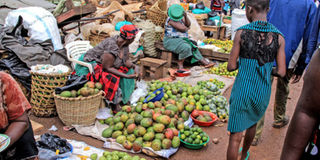Vendors opt to sleep in markets, walk to work

Vendors at Nakawa market yesterday morning. The market registered few buyers due to the ban on public transport. Photo by Rachel Mabala
On a daily basis, Ms Jane (not real name) boards a taxi from Zirobwe Town in Luweero District to Nakasero Market in the heart of Kampala to sell oranges and other fruits.
Jane did not return to Zirobwe on Wednesday evening because she could not manage the scramble for space in taxis after President Museveni banned public transport.
By about 9pm, people rushed to the different taxi parks and stages to grab a seat in the matatus most of which were making the final route before dawn when security was expected to crack down on drivers violating presidential directives aimed at preventing the spread of coronavirus.
Ms Jane could not manage to get home because by the time she left the market, there were no taxis to drop her to Zirobwe. She then decided to sleep in the market which runs for 24 hours.
“I have decided to stay here until the 14 days the President announced are over. What will I do? I cannot afford to pay special hire to get home and back on a daily basis. Since I slept here last night, I will manage the remaining 13 nights,” she said.
Jane told Daily Monitor that she only used mobile money to send money to her children to cater for their meals for the next two days, and that is the same means she will use when they call for more.
Other vendors in Nakasero market, the main food hub for the people who work within the Kampala and supplier of some markets around, said they had a tough morning walking to work.
Some of the traders said they made it to the market at about 9am after starting the journey at 6am.
When taxis and coasters are in operation, it takes about 30 minutes from Kireka, Wakiso District, to make it to the market if there is no traffic jam but for one vendor, who only identified herself as Grace, said it took her more almost two hours.
By the time this newspaper visited Nakasero market, the main activity was the operation to free up space in order to observe social distancing, one of the internationally recommended way of preventing the spread of coronavirus.
The vendors were carrying away the wooden boxes that they use for storing their merchandise whereas the umbrellas were being uprooted.
“We need reasonable space so that the people are not mixing like it has been during our good times. Those boxes were occupying a lot of space and some idlers have been sitting on them which makes our market congested,” Mr Godfrey Kakooza, the chairperson of the Nakasero Market Vendors Association, said.
Mr Kakooza said on a daily basis, there are always between 15,000 and 20,000 people, including vendors and farmers who deliver food items from different parts of the country.
He said this makes the market crowded, which may expose people to coronavirus.
Since the first case of Covid-19 was confirmed in Uganda, the vendors have not been allowed to go with children.
Their shelters were also removed yesterday in what the market leadership says will reduce the number of those who seek shelter even when they are not vendors.
Mr Kakooza warned buyers that with the ban of public transport, the food prices will increase because most of the vendors buy food from farmers who have been transporting it.
Meanwhile, some vendors were selling food behind Mapeera House but with sizable distance between each other.
Much as the numbers of buyers were slightly higher in Nakasero market and on Kafumbe Mukasa road, it was a different situation at Nakawa Market where vendors spent most of the morning serving few customers.
Mr Patrick Katuule, the chairman of the food vendors, said more people opted to stay home after government banning public transport.
“Food vendors are usually busy on an ordinary day but today is different because of the ban on public transport. This has really hit us hard. We pray and hope that this nightmare will be over,” he said.
At the same market, traders who deal in hand washing containers and metallic suitcases, put their products on the market, contrary to the presidential directives.
Their leader, Mr Samson Mande, said much as they welcome the directive, there are many people who still need to buy the hand-washing containers whereas them as dealers, need to make ends meet.
“How do you expect me to feed my family if I am seated home I had to come to work but looks like a dry day for us here in Nakawa market?” Mr Mande asked?
Low turn up of buyers was also seen in Banda and Namuwongo markets as people kept at home in the early hours of the day.




